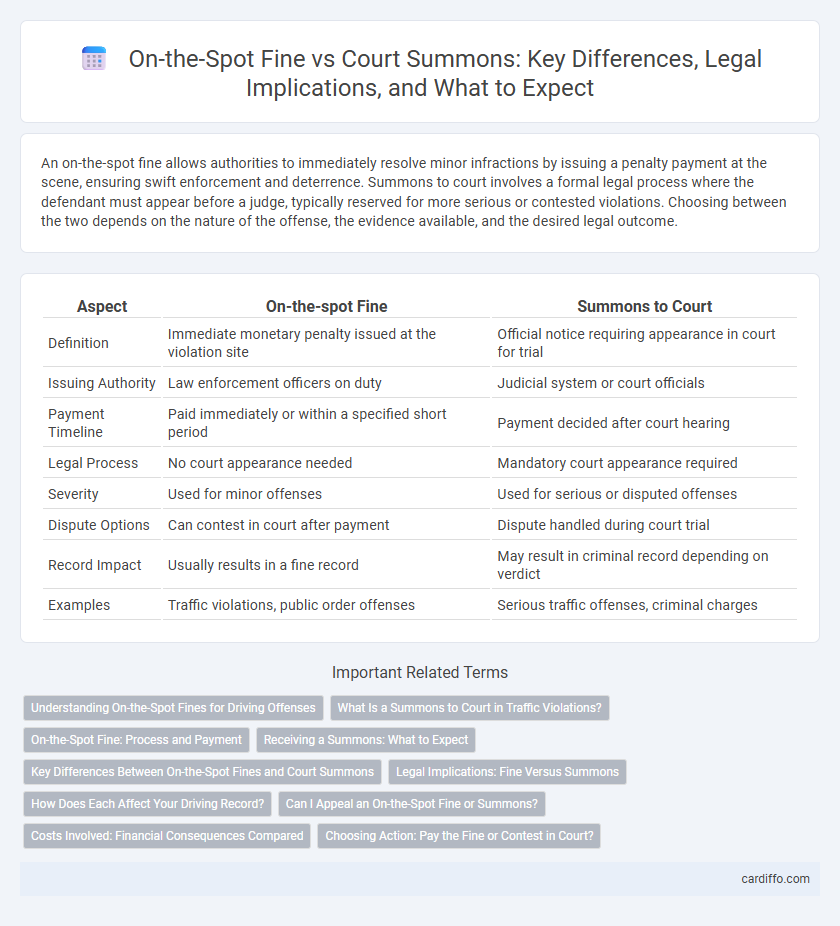An on-the-spot fine allows authorities to immediately resolve minor infractions by issuing a penalty payment at the scene, ensuring swift enforcement and deterrence. Summons to court involves a formal legal process where the defendant must appear before a judge, typically reserved for more serious or contested violations. Choosing between the two depends on the nature of the offense, the evidence available, and the desired legal outcome.
Table of Comparison
| Aspect | On-the-spot Fine | Summons to Court |
|---|---|---|
| Definition | Immediate monetary penalty issued at the violation site | Official notice requiring appearance in court for trial |
| Issuing Authority | Law enforcement officers on duty | Judicial system or court officials |
| Payment Timeline | Paid immediately or within a specified short period | Payment decided after court hearing |
| Legal Process | No court appearance needed | Mandatory court appearance required |
| Severity | Used for minor offenses | Used for serious or disputed offenses |
| Dispute Options | Can contest in court after payment | Dispute handled during court trial |
| Record Impact | Usually results in a fine record | May result in criminal record depending on verdict |
| Examples | Traffic violations, public order offenses | Serious traffic offenses, criminal charges |
Understanding On-the-Spot Fines for Driving Offenses
On-the-spot fines for driving offenses provide immediate penalties for minor traffic violations, enabling swift resolution without court involvement. These fines typically apply to infractions such as speeding, illegal parking, or running red lights, allowing authorities to enforce compliance efficiently. Choosing an on-the-spot fine often means avoiding the longer process and potential higher costs associated with a summons to court.
What Is a Summons to Court in Traffic Violations?
A summons to court in traffic violations is a formal legal document issued when the offense requires a court hearing rather than immediate payment of an on-the-spot fine. It mandates the individual to appear before a judge to contest or respond to charges such as reckless driving, DUI, or more serious traffic infractions. This process allows for a legal defense, potential penalties, or case dismissal, differing significantly from the simplified fine payment system used for minor violations.
On-the-Spot Fine: Process and Payment
On-the-spot fines are typically issued by authorized officers who assess the violation immediately and provide a payment notice at the location. Payment methods often include cash, credit card, or online transactions, allowing prompt settlement without court appearances. This streamlined process reduces administrative burdens and expedites resolution for minor infractions.
Receiving a Summons: What to Expect
Receiving a summons to court initiates a formal legal process requiring your presence on a specified date to address the alleged offense. Unlike on-the-spot fines settled immediately, a summons involves court hearings where evidence is presented, and legal arguments are made. Expect clear instructions on court procedure, potential penalties if found guilty, and the opportunity to consult legal representation prior to your appearance.
Key Differences Between On-the-Spot Fines and Court Summons
On-the-spot fines are immediate penalties issued for minor infractions, allowing quick resolution without court involvement, whereas summons to court require appearing before a judge for more serious offenses or disputes over the violation. On-the-spot fines typically involve a fixed amount payable on the spot or within a short period, while court summons may lead to a trial, legal representation, and potentially higher penalties. The procedural cost, time commitment, and legal consequences differ significantly, making the choice between on-the-spot fines and summons a critical aspect of offense management.
Legal Implications: Fine Versus Summons
On-the-spot fines require immediate payment and typically result in a quicker resolution without court involvement, reducing legal costs and time. Summons to court mandates an appearance before a judge, potentially leading to a formal trial, higher legal expenses, and the risk of more severe penalties upon conviction. Choosing between an on-the-spot fine and a summons influences the legal process, affecting both the immediacy of resolution and the severity of legal consequences.
How Does Each Affect Your Driving Record?
On-the-spot fines typically result in immediate payment and may add demerit points directly to your driving record, affecting insurance premiums and license status. Summons to court often involve a formal hearing where penalties can range from fines to license suspension, potentially causing more severe impacts on your driving record. Both actions influence your driving history, but court summons generally carry greater long-term consequences.
Can I Appeal an On-the-Spot Fine or Summons?
You can appeal both an on-the-spot fine and a summons to court, but the procedures differ significantly based on jurisdiction and the nature of the violation. For on-the-spot fines, appeals often require submitting a written request or attending a hearing within a specific timeframe, typically 14 to 30 days from the issuance date. Summons to court demands a formal court appearance where you can contest the charges, present evidence, and seek dismissal or reduction of penalties through legal representation.
Costs Involved: Financial Consequences Compared
On-the-spot fines require immediate payment, often less costly and include fixed penalties, while summons to court may lead to higher expenses such as legal fees, court costs, and potential increased fines upon conviction. Court proceedings sometimes result in additional financial consequences like bail, compensation, or loss of income due to time off work. Choosing an on-the-spot fine generally minimizes overall financial burden compared to the unpredictable costs associated with summons to court.
Choosing Action: Pay the Fine or Contest in Court?
Choosing between paying an on-the-spot fine or contesting a summons in court depends on factors such as the severity of the offense, potential legal consequences, and personal circumstances. Paying the fine typically resolves the issue quickly without court appearances but may result in a permanent record or insurance premium increases. Contesting the summons in court might be worthwhile if you have strong evidence to challenge the violation, potentially avoiding fines and points on your license, though it involves court costs and time commitments.
On-the-spot fine vs Summons to court Infographic

 cardiffo.com
cardiffo.com